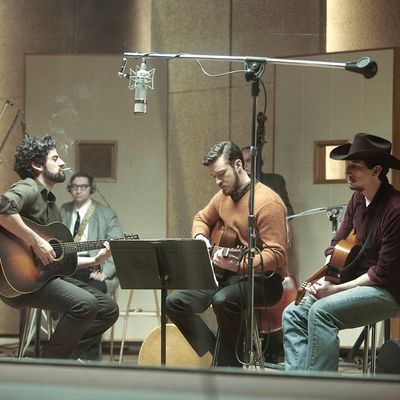
Joel and Ethan Coen’s Inside Llewyn Davis is an exquisitely crafted tale of woe with heartfelt early-sixties folk music — and an overarching snottiness. It’s a hell of a mix of tones, but that’s the challenge the Coens’ movies pose: How do we reconcile their cheerfully disparate impulses? (Do we need to? We need to try.) Consider the setting: a pre–Bob Dylan Greenwich Village, scarred by McCarthyism but more and more alive to the stirrings of protest. The world is lovingly evoked, transcendently soundtracked (under the direction of T Bone Burnett). But it’s also the stage for a definitively downbeat story of an asshole folksinger who pays the piper for his bad personality. The film might be the ultimate proof that the Coens can find hopelessness in the darnedest places.
The protagonist, Llewyn Davis (Oscar Isaac), is a man of deep contrasts. The camera finds him bent over a guitar in the Gaslight Café on Macdougal Street, singing “Hang Me, Oh Hang Me” with tender grace. (Careful what you wish for, Llewyn.) Cinematographer Bruno Delbonnel’s palette is silken shades of gray and luminescent whites; the cigarette smoke creates a scrim through which the audience is barely visible. It’s as if Llewyn were alone with his thoughts and dreams — and with that unspeakably lyrical heritage that gives us such beauty from such misery. Then he leaves the stage, goes out to the alley, and gets the shit kicked out of him by a mocking stranger. Sometimes there’s Coen-iness so fast.
Inside Llewyn Davis is shaped as a showbiz rags-to-riches story that stuns you by staying raggedy. Crappy stuff happens, there’s sublime music and everything seems possible, and then more crappy stuff happens. But with Isaac front and center, the movie is never monotonous. With his thick, unruly black hair and scruffy beard, he evokes Lenny Bruce and Al Pacino circa Serpico — countercultural touchstones. He makes Llewyn an asshole of stature, chafing at his fate but always — unlike many of the Coens’ tunnel-visioned protagonists — getting the (sick cosmic) joke. And nothing corrupts his music. Isaac doesn’t hit every note dead on, but his singing feels more full than that of performers with better pipes. The notes he hits reach your soul.
The rest of the characters are types, though framed to be mythic types and make you laugh out loud. Young folkies like the square, earnest soldier-boy singer Troy Nelson (Stark Sands) or the go-along-to-get-along bass-singing dweeb Al Cody (Adam Driver) are weird enough for their own movies. The homeless Llewyn crashes on the sofa of a duo known as Jim and Jean, played by Justin Timberlake and Carey Mulligan. Timberlake’s tenor meshes perfectly with Mulligan’s Earth Mother tones, and she’s lit like an angel onstage — she has never looked this radiant. Offstage, though, Jean is a relentless scold who unloads mercilessly on Llewyn for (maybe) knocking her up. (“Everything you touch turns to shit. Like King Midas’s idiot brother.”)
Of course the humiliations are funny, sometimes a scream. There’s a cat that Llewyn keeps losing and finding and losing—the running gag has a two-pronged punch line, one tragic, the other absurdly triumphant. The Coens toy brilliantly with movie tropes. They layer insults and non sequiturs like no one else. They worship freaky actors. Llewyn gets a ride to Chicago to audition for super-manager Bud Grossman (obviously Albert Grossman, Dylan’s manager), and there’s John Goodman in the backseat as an obese, foul-mouthed junkie musician, pickled in his own bile, and Garrett Hedlund as the Neal Cassady–like pretty boy who tends to the big man when he hobbles on crutches into the restrooms of (gorgeously iconic) gas stations for another fix. Ethan Phillips is the peppy little professor who has along with his wife (Robin Bartlett) adopted Llewyn as a sort of bohemian pet—their starving “folksinger friend” they can feed and show off to dinner guests. They’re so wonderfully endearing you can forgive them for their condescension. But you can’t forgive F. Murray Abraham’s Grossman, who listens so intently to Llewyn’s movingly raw rendition of “The Death of Queen Jane” that you’re sure he’ll take the struggling singer on. This is not a kind world, though. Grossman’s response seems like the cruelest blow — except there are more to come. A visit to Llewyn’s elderly, addled father ends with an ugly (too cheap) gag. And the final scene is like an anvil from on high.
Inside Llewyn Davis is partly inspired by the late Dave Van Ronk, who conventional wisdom says was terminally overshadowed by his quasi protégé, Bob Dylan. Isaac bears little resemblance to Van Ronk, but the Coens evidently dug the idea of punishment arriving in the form of Dylan — the symbol for so many of us of rebirth. They’re mean that way. But there’s something deeper at work than mere nihilism. In his autobiography, The Mayor of MacDougal Street, Van Ronk notes the role of Jews as “folk revivalists” in search of authenticity who “adopted the music as part of a process of assimilation to the Anglo-American tradition.” I think the Coens are in search of the same authenticity, but for different ends. They want to show that blinkered stumblebums in a malignant universe can find transcendence via nativist works of art — but that art stands apart from wretched life. There’s no spillover. The tones of Inside Llewyn Davis can’t be reconciled because they’re meant to be irreconcilable. Once the music stops, you’re in the shit.
This review originally appeared in the Dec. 9, 2013 issue of New York Magazine.


